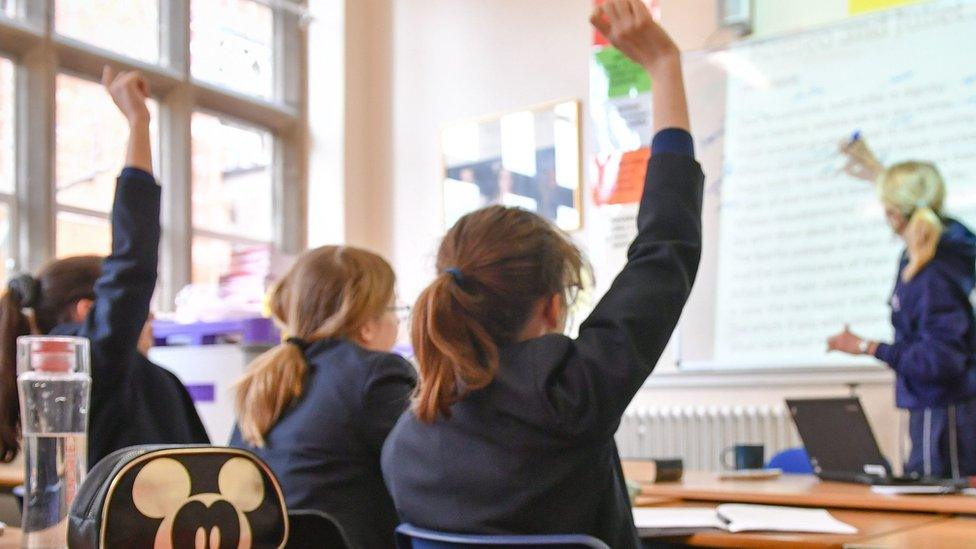School strikes: Expense and workloads driving teachers out of job
- Published
- comments
Tomi Rowlands is quitting after 13 years as a teacher because he was struggling with the cost of living
Striking teachers have said the cost of living and heavy workloads are driving them out of the job they love.
Tomi Rowlands has decided to leave his teaching post and said some colleagues were using food banks to get by.
He was one of thousands of members of the National Education Union (NEU) who were striking on Wednesday over pay and school budgets.
The Welsh government said it would continue "constructive" meetings with unions to try to resolve the dispute.
It said about 40% of schools were closed and the remainder either open or partially open.
Mr Rowlands, who will leave his job at Ysgol Bro Hyddgen in Machynlleth, Powys, in April, said he and his family were unable to afford to buy a bigger property.
"The cost of houses have gone up so much and not linked to wages, it needs to be fixed," he said.
"I love the community I live in, I love the community I teach in, but you have to find a work-life balance."
What do parents and children think of school strikes?
He started teaching 13 years ago and said it was difficult then to afford rent and buy a house in the area, but things had become much worse.
He added: "Our support staff use food banks, because the cost of living crisis has got so bad".
Mr Rowlands also said there was a teaching recruitment and retention crisis.
"One in three teachers leave the profession within five years and the reality is going to get a lot, lot worse," he said.
"Because less and less staff are in schools, there's more and more of a workload on our teachers - and that's a perfect storm."


Parent Lianne Carpenter, with her son Mason, says she is in support of the strikes but they have a "massive impact"
What do parents and pupils think?
Parent Lianne Carpenter said she supported strike action but it had a "massive impact" as she had to take a day off work to look after her 12-year-old son Mason.
She said he was also anxious about having to catch up on school work lost due to days off, although he had been given some homework and online work to do on Wednesday.
"But it's not the same as being in school," she told BBC Radio Wales Breakfast.
"I'm in support of teachers because we can't be without them and I think education has suffered enough because of Covid.
"I really hope that, at the end of this, their voices will be heard by the government and that something is done about it so all of this won't be for nothing."


Teachers joined the picket line at Llanishen High School in Cardiff from about 0730 GMT on Wednesday
What schools are closing?
Hundreds of schools in Wales were closed due to the first of four planned days of strikes, which started on Wednesday and continue again on Tuesday 14 February, Wednesday 15 March, and Thursday 16 March.
About a third of Wales' 1,500 schools were closed in full on Wednesday while hundreds of others told some classes to stay at home.
Details of full closures were listed on council websites, but as an example:
Rhondda Cynon Taf: 37 schools were closed to everyone, 68 partially closed, with10 open
Anglesey: 25 closed, three partially closed and 18 remaining open
Carmarthenshire: 20 closed, 39 partially closed, with 54 open
Striking teachers are not required to give advance notice of their intention.
Many schools therefore did not have a full picture of the situation until early on Wednesday morning.
Ian Gerrard, head teacher at Ysgol Aberconwy, in Conwy, said the school had carried out a risk assessment ready for the strike and had asked about 600 pupils throughout years seven, eight and nine to stay at home.
Mr Gerrard added they were providing "normal education" for the rest of the school and hoped the impact on them would be "minimal".
But the head teacher said the school would not know the full impact of the industrial action until it became obvious which members of staff would strike.
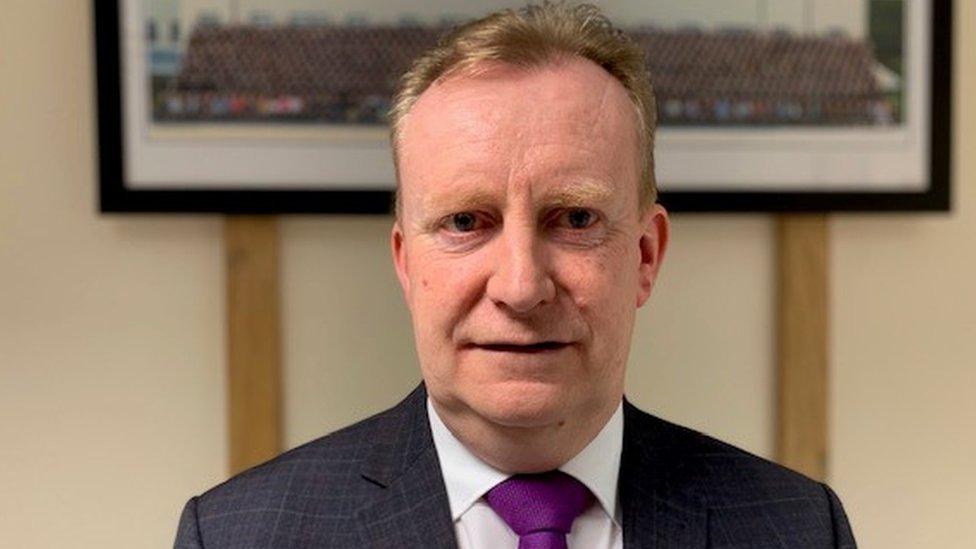
Ian Gerrard says he is not completely sure which of his staff will be striking
The National Association of Head Teachers (NAHT) representing many primary head teachers also started its action short of a strike.
Liz McLean, district and branch secretary for Denbighshire NEU and one of the three executive members for Wales, has taught at Ysgol Plas Brondyffryn, Denbigh, which specialises in autism education, for 17 years.
"I've never seen education in such a critical condition, I would say that education is in crisis," she said.
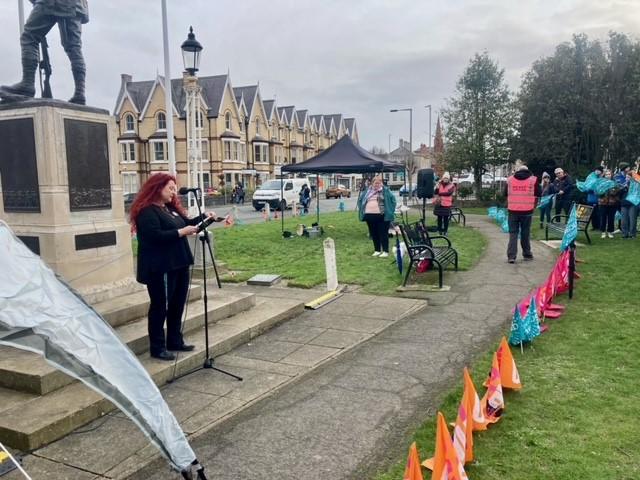
Liz McLean (left) taking part in a NEU rally in Colwyn Bay on Wednesday
She said teachers had seen a 20% real terms pay cut in the past 12 years, while support staff had seen their wages cut by more than 30% in real terms.
"The current cost of living crisis is dramatic, we hear quite often of people not being able to fuel the car so they can get to work, but the other issue is some people are having to use food banks, which isn't right in this day and age.
"I'm at the end of my career, I'll be gone soon, I want the situation to improve for newer, younger teachers who can't get on the housing ladder, who are leaving the profession they love to go and work in other professions because the pay and work load are much better there."

Striking teachers Alice Parry and Rob Bloor explain why they took action
'Something needs to change'
Rob Bloor, who has been a teacher for 15 years, said it was not an easy decision to take strike action but changes were needed with many teachers leaving the profession.
"The education of children has been impacted because of the value that the government are putting on our profession at the moment," he said from a picket line at Llanishen High School in Cardiff.
"Something needs to change very, very quickly to recruit more teachers and to keep people in the profession."
Alice Parry said she never envisaged striking when she began her teaching career in 2014.
"We have felt like we have needed to come out today to show our support," she said.
"I know of teachers taking on second jobs to make ends meet and that's not uncommon. It's a shame."
David Evans, from NEU Cymru, said it was "positive" that union was due to meet Welsh government officials to discuss its demands on Wednesday.
"The fact that they are now scheduling these meetings is extremely positive and hopefully they'll start coming up with an offer that we can accept," he said from a picket line in Cardiff.
Minister wants to 'resolve dispute'
Wales Education Minister Jeremy Miles said he wanted to "reassure pupils and parents that we are working with our partners to resolve the dispute".
"I was able to make a proposal in a relation to a one-off payment in this financial year, together with a commitment to discuss workload... and we've also been looking at what we can do to adjust the process that we have for setting pay year-on-year, so there are three separate areas that are being discussed," he told BBC Radio Wales.
The UK government has said responsibility for funding public services lies with ministers in Wales, but it had provided the Welsh government with record levels of funding over the next three years.

THE LEARNERS: It's a new term in the beginners' Welsh language class
A SPECIAL SCHOOL: Behind the scenes at a school like no other

- Published1 February 2023
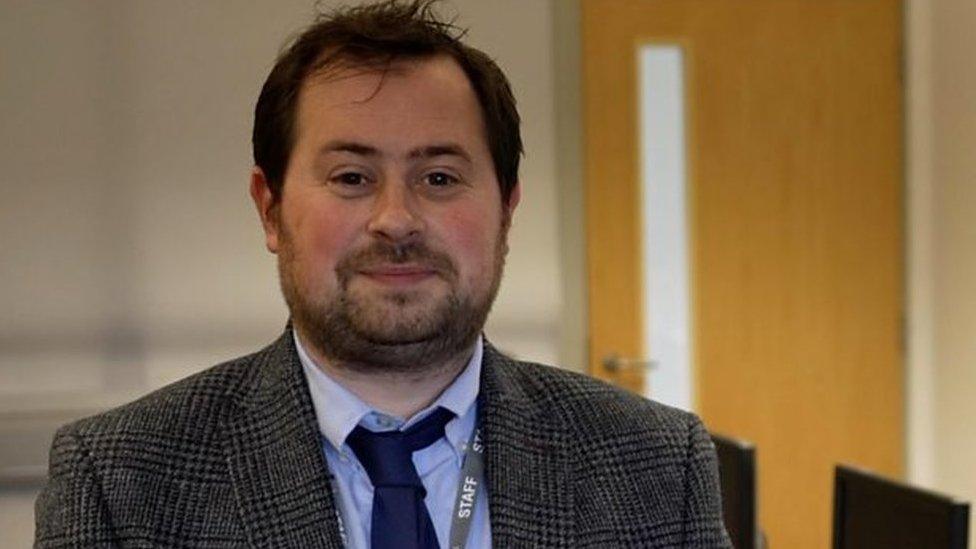
- Published1 February 2023

- Published27 October 2022
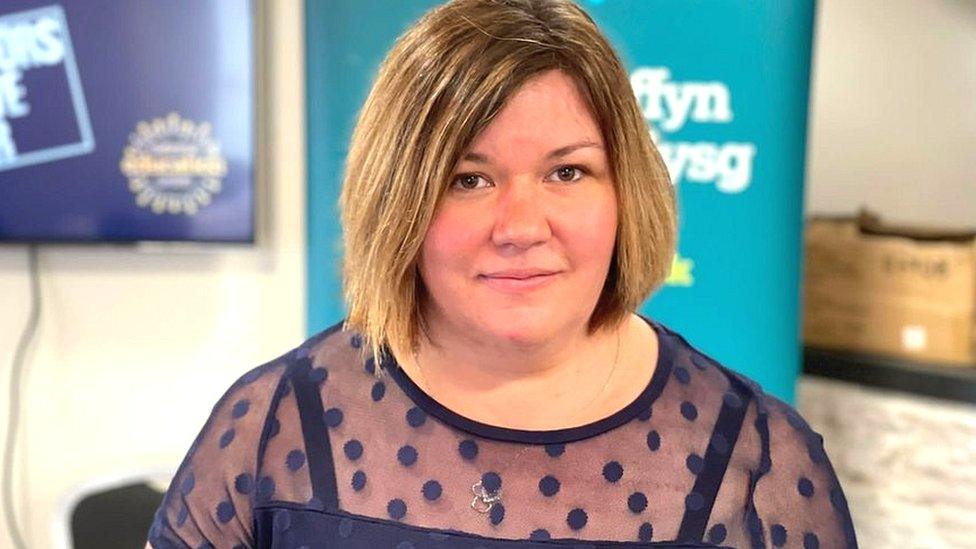
- Published23 January 2023
